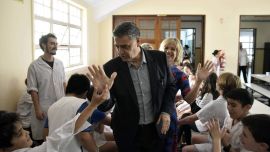Miguel Vitagliano, one of Argentina’s most prominent contemporary novelists of recent years, has been keeping a low profile of late. Yet he’s now ready to unveil his new book to the world.
In creating his 11th novel, the 57-year-old author has crafted a new piece of historical fiction exploring love and tragedy – and the complications that arise from them – during the time of one of South America’s most brutal wars.
The resulting novel, Enterrados (“Buried”) is set in the times of the bloody Triple Alliance War, when Argentina, Brazil, and Uruguay were all pitted against Paraguay, which lost somewhere between 50 and 80 percent of its population, and as much as 95 percent of its men and boys.
The six-year war (1864- 1870), which French historian René Girard described as “genocidal,” did not come to an end until the Paraguayan leader, Francisco Solano López, was found and killed by the Brazilian Army.
The war, in which Paraguay was outnumbered by forces by 16-to-1, included atrocities such as the calling up of young children, untrained soldiers and retirees to fight in brutal battles. It is this unprecedented, hellish violence – reminiscent in many ways of Dante’s ‘Inferno’ – that Vitagliano chose as a backdrop for his novel. Yet the link to the Italian writer’s epic poem runs deeper.
Bartolomé Mitre, Argentina’s president at the time of the war and famously known as the translator of Dante’s work from its native Italian text into Spanish, went on leave to serve in the conflict as the head of the allied forces. Finishing his translation almost 40 years after he decided to do it, it was a mammoth project that Vitagliano likes to think had parallels with the brutality of the Triple Alliance War.
Speaking of his own lengthy writing process – this work took around 10 years – Vitagliano explains “it was a long investigative process.”
However, the writer says he did initially set out to write a historical work of fiction. But as time ticked by, Vitagliano says he came fascinated with the influence of Mitre’s experience translating Dante’s work and how that related to his role as a general during the conflict, as well as his significant political contribution toward the consolidation of a US-style political system.
While there’s no concrete evidence that Mitre saw a connection between the lengthy violence he himself participated in during the war, and the brutal incidents of the book, others with detailed knowledge of both Dante’s masterful work and the conflict have also observed similarities. Long rumoured to have been translating the text in between battles, critics have delighted in thinking that Dante’s work was somehow absorbed into Mitre’s psyche and that he was, in a sense, imitating what he was translating.
As a professor of literary theory at the University of Buenos Aires (UBA), it’s clear that Vitagliano’s experiences teaching have deeply influenced his passion for penning fiction. “I don’t divide between my two jobs, they compliment each other, of course,” he says. “I’m not a different person when I’m teaching to when I’m writing.”
Noting that Dante’s famous work deals with themes like the search for passion and love, Vitagliano’s novel utilises strong and commanding female voices, such as Eliza Lynch, the Irish-born wife of Solano López, and Mitre’s wife, Delfina. “I liked the contrast between Lynch who is a sort of Madame Bovary character, accustomed to high-class European living, and Mitre’s wife, who is highly accomplished and could have helped him with the translation of the text,’ said Vitagliano.
Enterrados, published by Edhasa, in Argentina, is currently being translated into English, with the working title of “Buried.” It is expected to be released within the 12 months.




















Comments